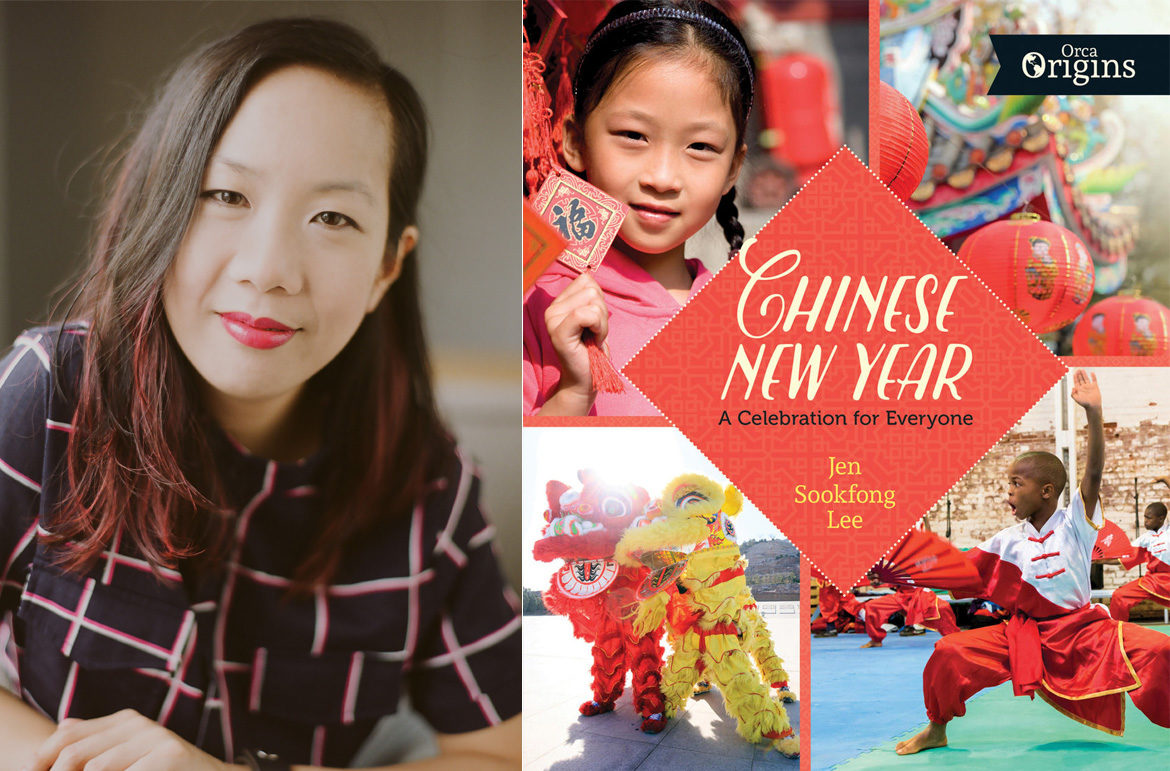Jen Sookfong Lee is a powerhouse—author, broadcaster, writing instructor, and vocal tweeter. You have probably heard her on CBC Radio programs such as On the Coast, Canada Reads, All Points West, or The Next Chapter talking up west coast books. Or you may have read her award-winning adult fiction The End of East, The Better Mother, and The Conjoined.
Jen’s new book, Chinese New Year is part of the Orca Origins series, which explores different cultural celebrations—their history, their dissemination, their significance—in a way that works for kids. Orca Book Publishers approached Jen with the idea, and it took off from there.
“Chinese New Year is a popular and well-known holiday, but like Christmas or Halloween, it grew out of history and stories,” says Jen in the book. “To understand Chinese New Year is to understand what makes Chinese culture unique.”
You include a lot of personal anecdotes. Did you do any family interviews or personal research? How did that go?
I sent an email with questions to my sisters, which elicited mixed reactions. As I discovered, people who are not writers don’t remember details, and some of my sisters had completely blanked on large portions of our childhood! My mother was an important resource for the recipes, which was sometimes a challenging exercise in translation. I realized I knew the names of a lot of ingredients in Chinese but not in English. For example, I had always thought fat choy, a really important ingredient used in New Year soups and noodles, was a type of seaweed, but as it turns out, it’s actually a type of moss that grows in the Gobi desert.
This is your first book of nonfiction for readers aged 8–12. Was writing for this audience different for you?
Absolutely! I’ve written for young adults before, but never for this age group, which is middle school. What I found challenging (in a good way) was writing about really difficult topics. You can’t discuss the history of Chinese New Year without discussing the history of China, which is marked by conflict and political upheaval. I remember texting a friend of mine, “How does one write about genocide for 11-year-olds?”
What considerations were made for this audience?
I certainly tried not to talk down to these readers. I fundamentally believe that kids can process anything, even if it’s complicated and upsetting, as long as the language is appropriate and we use concepts they can relate to. Writing about the Cultural Revolution or the Great March Forward really tested my beliefs! But I have discovered, especially given the last two years of current events, that children really do understand things like oppression. They might call it bullying or just being mean, but they get it.
Fun Fact: Drumming is prominent during Chinese New Year, both to scare off evil spirits and to provide accompaniment to the lion dancers.
The book includes lots of wonderful facts about Chinese New Year traditions around the world. What kind of research went into the book?
All the research! Actually, what’s great about Chinese New Year is that it’s been adopted in so many countries as an official holiday or a tourist attraction. So the New Year and Spring Festivals often have their own organizations that promote their events. So it wasn’t too hard to find out about the Lantern Festival in Sydney or the fireworks in Hong Kong harbour.
Did you learn anything surprising or new to you during your research?
I think maybe the coolest thing I learned was that lucky money can be sent electronically, with cute red envelope graphics. I mean, what will those tech people think of next?
What is your favourite part of celebrating Chinese New Year?
It’s always the food! This is a cliché, of course, but the food my mother cooks at Chinese New Year is unlike any other food in the world to me. This year, she isn’t doing the cooking, my sisters and I are, which is bittersweet because my mother is aging and doesn’t have the energy to do it anymore. However, I’m interested to see if what we make tastes the same as my mom’s. Probably not!
Chinese New Year 2018 officially begins on Friday, Februrary 16, 2018. Wish someone a Happy Chinese New Year in Cantonese: “Gung hay fat choy” (“May you have prosperity”), “Sun tai geen hong” (“May you have good health”) and “Sun neen fai lok” (“Happy New Year”)
Join Jen Sookfong Lee in Vancouver on Sunday, February 11 to celebrate The Year of the Dog with a special book launch.
Chinese New Year by Jen Sookfong Lee (Orca Book Publishers) recalls her childhood in Vancouver, British Columbia, and weaves family stories into the history, traditions, and evolution of Chinese New Year. Lavishly illustrated with color photographs throughout. From its beginnings as a farming celebration marking the end of winter to its current role as a global party featuring good food, lots of gifts and public parades, Chinese New Year is a snapshot of Chinese culture.

